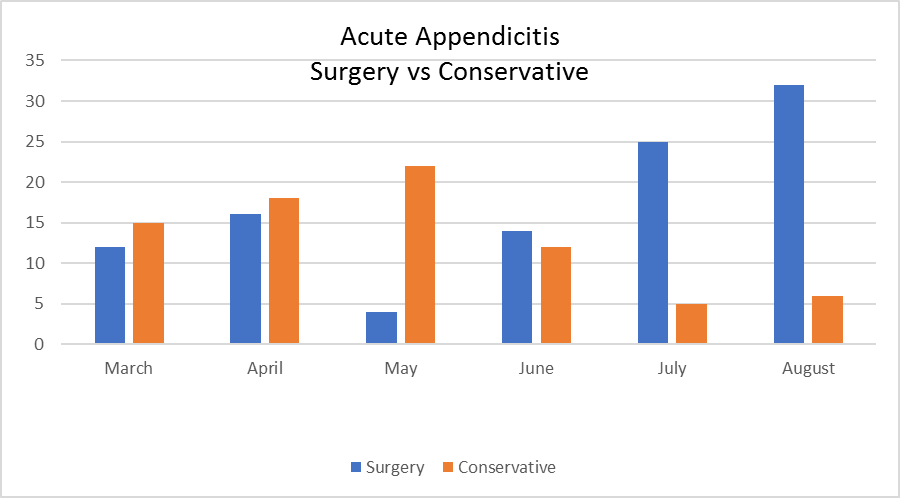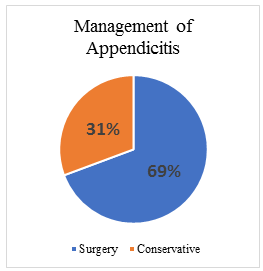International Surgery Case Reports
OPEN ACCESS | Volume 8 - Issue 1 - 2026
ISSN No: 2836-2845 | Journal DOI: 10.61148/2836-2845/ISCR
Ariff I, Dewaraj V, Sarmukh S *, Azmi H
Department of Surgery, Hospital Sultan Haji Ahmad Shah, Temerloh, Pahang, Malaysia.
*Corresponding Author: Sarmukh S, Resident, Department of Surgery, Hospital Sultan Haji Ahmad Shah, Temerloh, Pahang, Malaysia..
Received date: April 27, 2021
Accepted date: May 10, 2021
published date: May 19, 2021
Citation: Ariff I, Dewaraj V, Sarmukh S, Azmi H, (2021) “Paradigm Shift in Managing Appendicitis (Acute and Complicated) In District Hospital (HOSHAS) During Covid-19 Pandemic. A Retrospective Study.”. International Surgery Case Reports, 2(4); DOI: http;//doi.org/03.2021/1.1019.
Copyright: © 2021 Sarmukh S. This is an open access article distributed under the Creative Commons Attribution License, which permits unrestricted use, distribution, and reproduction in any medium, provided the original work is properly cited
Background: COVID-19 pandemic has made major impact in medical field. Practising principles of reducing direct contact and social distancing in hospital has changed some parts of management. Acute appendicitis being the commonest surgical emergency, we wanted to study the change towards the trend of managing such cases during this pandemic.
Aim: To compare conservative vs surgical management in appendicitis in a district hospital (HoSHAS) during COVID-19 outbreak period of 6 months (March - August 2020)
Method: Data of patients with appendicitis throughout March till August 2020 was collected and grouped into two cohorts;1) Acute appendicitis and 2) Complicated appendicitis. These groups further subdivided into 1) conservative vs 2) surgical management.
Results: There were 251 appendicitis cases with the mean age of 28.4 ± 15.1 years in this period. 186 were acute appendicitis and remaining 65 were complicated appendicitis. 174 cases were operated and 77 cases were treated conservatively. In acute appendicitis group 40% (n:74) and complicated appendicitis group 4% (n:65) mainly appendicular mass were treated conservatively. 46 cases treated surgically stayed lesser than 3 days as compared to only 7 cases treated conservatively.
Conclusion: Acute appendicitis and appendicular mass groups can be treated conservatively. Perforated and suppurative groups require surgical intervention. Surgical approach involves single prolonged direct contact (>15minutes) with patients. Conservative management avoids this problem. However, duration of stay in conservative cases is longer. Hence, the dilemma; which is a better option during this pandemic? Since surgical approach involves more medical personnel (e.g.: anesthesiology department) and the patient is subjected to various locations, conservative management still has the upper hand
Introduction:
COVID 19 (Coronavirus disease) is an illness caused by novel coronavirus (SARS-CoV-2) which is first identified in Wuhan City, Hubei Province, China. It is first reported to WHO on 31st December 2019 and WHO declared that COVID-19 as a global pandemic on 11th March 2020.
The first case of COVID 19 in Malaysia was detected on 25th of January 2020 which is from 3 Chinese national that had close contact with infected person in Singapore. This event led to rise in number of cases thus the government implemented Movement Control Order (MCO) on 16th March 2020. This MCO brought many changes in SOP’s (standard operating procedure) in a lot of fields including medical practices.
Surgery is one of the many services that are being affected during this period. Almost all elective surgery has been reduced and only acute life-threatening emergency operation are performed. Appendicitis is one of the most common cause of acute emergency through out the globe. During this period, the management of appendicitis was divided based on acute appendicitis or perforated appendicitis which can be treated conservatively or surgically.
The objective of this study is to observe the change in management of appendicitis in single centre (district hospital- Hospital Sultan Haji Ahmad Shah, Temerloh) during COVID 19 period.
Methodology
This is a retrospective observational study conducted in single centre, district hospital in Malaysia which is Hospital Sultan Haji Ahmad Shah, Temerloh, Pahang. Informed consent is obtained from all patient. The clinical data that are taken are based on all cases that had been referred to Surgical Department that is then diagnosed as Appendicitis by the Surgeon.
The diagnosis of Appendicitis either acute or perforated appendicitis is mainly based on history, clinical examination and blood investigation.
The exclusion criteria include: 1) patient that came with peritonitis 2) patient with previous surgical scar 3) patient that had been diagnosed as appendicitis previously 4) patient that had gynecological problem 5) patient that had indeterminate diagnosis 6) refusal of surgery.
The initial diagnosis was made by Emergency Department and then referred to Surgical Department. Medical history, examination and all relevant investigation were performed at ED itself. Then, patients were assessed by Surgeon and divided into Acute appendicitis or Perforated appendicitis. Then patients were admitted to Surgical Ward. Patient that had been diagnosed with acute appendicitis was either treated conservatively or subjected to operation. Patient that are diagnosed as Perforated appendicitis were subjected to operation.
COVID 19 screening was done at Emergency department prior to assessment and another screening is done by Surgical Team prior to admission. Cases that are subjected to operation, need to be screened. Those with symptoms or high-risk area, were swabbed. Regardless of the PCR swab result, operation is done using PPE.

Figure 1: Showed Algorithm of Managing Appendicitis patients
Results
During the MCO period, the management of acute appendicitis has shift towards conservative management more than operative. As the study shows the number of operation (appendicectomy) reduces during the MCO period during COVID 19 pandemic. There were 251 appendicitis cases with the mean age of 28.4 ± 15.1 years old in this period. Acute appendicitis were 74% (n: 186) and complicated appendicitis were 26% (n: 65). 69% (n: 174) were operated and 31 % (n:77) were treated conservatively. Conservative management was carried out in acute appendicitis group 40% (n:74) and in appendicular mass patients 60% (n:3) as shown in table 1. 46 cases treated surgically stayed lesser than 3 days as compared to only 7 cases treated conservatively.
|
Groups |
1 |
2 |
3 |
4 |
Total |
|
|
Procedure |
Operative |
60 % (n:112) |
100 % (n:50) |
100% (n:10) |
40% (n:2) |
69% (n:174) |
|
Conservative |
40% (n:74) |
0 |
0 |
60% (n:3) |
31% (n:77) |
|
|
Total |
186 |
50 |
10 |
5 |
251 |
|
Table 1: Showed the Types of Appendicitis with its management.
1: Acute appendicitis
2: Perforated appendicitis
3: Supurative appendicitis
4: Appendicular mass

Graph 1: Showed the type of appendicitis.
There is a total of 251 patient.The commonest type was acute appendicitis which was 74% (n:186), followed by perforated appendicitis 20% (n:50).

Graph 2: Showed the monthly distribution of appendicitis cases with regards to the management (operative vs conservative). From the period March 2020 to May 2020, conservative management were commonly practised. This showed in month of April , May and June 2020 the conservative managment was at peak.

Graph 3: Showed the management in acute appendicitis was threated conservatively 40 % (n:74).

Graph 4: Showed the overview of appendicitis cases are being operated 69% (n:174) meanwhile 31% (n:77) undergoes conservative treatment.
There was a total of 251 patient.The commonest type was acute appendicitis which was 74% (n:186), followed by perforated appendicitis 20% (n:50), suppurative appendicitis 4% (n:10) and appendicular mass 2% ( n:5) as shown in Graph 1. A total of 60% (n:112 ) acute appendicitis cases were operated and remaining 40% (n:74) were treated conservatively as shown in Graph 2. All perforated and suppurative appendicitis cases were operated. In appendicular mass patients 60 % (n:3) was treated conservatively. An overview sees 69% of total appendicitis cases are being operated meanwhile 31% undergoes conservative treatment as shown in Graph 3.
Discussion
The number of appendicitis case during COVID 19 pandemic in local setting throughout the duration of the study are evenly distributed every month from March to August 2020 (6 months) . This showed that patient in the area had no difficulty presenting to the hospital to get treatment even though they are subjected to Movement Control Order (MCO).
In this study, the number of cases operated for acute appendicitis showed marked reduction as conservative treatment using antibiotics did not fail. However, the duration of hospital stay increased as patient required longer duration of intravenous antibiotics.
Surgeon’s clinical judgement in deciding whether that the patient diagnosed with acute appendicitis that require surgical intervention is influenced by COVID 19 status. During this period, surgeons prefer conservative management towards acute appendicitis. This is because most of the resources are diverted to focus on COVID 19 treatment. Thus, there is a shortage in personal protective equipment, lack of isolation wards and medical staff available. Moreover, this study is conducted in a district hospital, where the resources are limited.
However, in perforated appendicitis and suppurative appendicitis still require surgical approach. This caused prolonged direct contact with patient, including the Anesthesiology Department thus, increasing the risk of transmission of COVID 19. It is a major issue during this period but for perforated appendicitis and suppurative appendicitis, surgical approach is inevitable.Compared to acute appendicitis, which can be treated conservatively, the problem can be avoided completely. COVID 19 pandemic plays a major role in deciding on management of acute appendicitis either conservative or surgical approach. This study shows that conservative management of acute appendicitis is a better option compared to surgical intervention as it reduces the risk of transmission the COVID 19.
Conclusion
Conservative management is more emphasized in managing appendictis (acute and complicated) patients during this pandemic. However, duration of stay in conservatively treated patient was longer. This goes against with the other fundamental principle; reducing overcrowding in hospital. Hence, this brings to the dilemma, which is a better option during this pandemic; conservative or surgical approach? On the other hand surgical approach increases numbers of medical personnels being in direct contact with patients as it involves of both surgical and anesthesiology departments. Hence, conservative approach is still a better option in the Covid-19 pandemic for a lesser direct contact with patients.